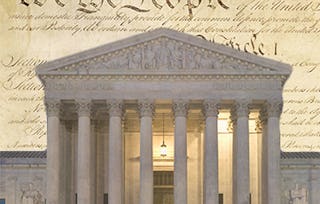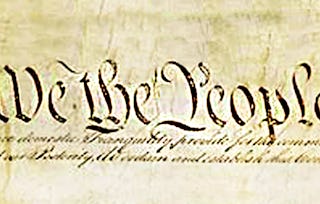Chemerinsky on Constitutional Law: Individual Rights and Liberties will highlight the construction and interpretation of the U.S. Constitution through the centuries with an emphasis on protections of individual liberties and the evolution of equal protection. You'll learn the history behind the Constitution, cases that formed important precedent, and how changes in interpretation have been dependent on shifts in cultural and political climate as well as the composition of the Supreme Court.

Chemerinsky on Constitutional Law – Individual Rights and Liberties
3 days left! Gain next-level skills with Coursera Plus for $199 (regularly $399). Save now.

Chemerinsky on Constitutional Law – Individual Rights and Liberties

Instructor: Erwin Chemerinsky
13,148 already enrolled
Included with
(84 reviews)
Skills you'll gain
Details to know

Add to your LinkedIn profile
See how employees at top companies are mastering in-demand skills

There are 7 modules in this course
What's included
1 video3 readings
How are individual rights protected? In this module we’ll take a look at three of the structures that protect our individual liberties: the state action doctrine, the application of the bill of rights to the states, and the levels of scrutiny principle.
What's included
3 videos1 reading1 assignment
What rights are enumerated in the Constitution? How has the court's understanding and protection of these rights evolved? In this lecture we'll become familiar with the rights that are both specifically enumerated and implied by the text of the Constitution.
What's included
8 videos1 reading1 assignment1 peer review
In this module we’ll examine how equal protection has been applied to different suspect classifications such as race, gender, citizenship, and more. In addition, we will consider how the court has used levels of scrutiny in order to determine when the government can permissibly discriminate based upon suspect classifications.
What's included
7 videos1 reading1 assignment1 peer review
Why is freedom of speech protected as a fundamental right? What is its importance? In this module we’ll review four possible answers to this question. We’ll also examine the basic principles that guide the Supreme Court’s methodology when examining questions of free speech. Finally, we’ll take a look at the types of speech that have not been traditionally protected and the limitations that can be imposed on where protected forms of speech can be exercised.
What's included
4 videos1 reading1 assignment1 peer review
In our final lecture module, we’ll briefly examine the Lemon Test, named after the Lemon v. Kurtzman case in which it was first articulated, to see how the court has evaluated cases regarding the Establishment Clause. We’ll also take a look at how the court decides questions regarding the Free Exercise Clause.
What's included
1 video1 reading1 assignment1 peer review
As the course draws to a final close, we would like to thank you for your participation.
What's included
2 readings
Instructor

Offered by
Explore more from Law
 Status: Preview
Status: PreviewUniversity of California, Irvine
 Status: Preview
Status: PreviewUniversity of Pennsylvania
 Status: Preview
Status: PreviewYale University
 Status: Preview
Status: PreviewYale University
Why people choose Coursera for their career

Felipe M.

Jennifer J.

Larry W.

Chaitanya A.
Learner reviews
- 5 stars
91.76%
- 4 stars
5.88%
- 3 stars
1.17%
- 2 stars
0%
- 1 star
1.17%
Showing 3 of 84
Reviewed on Oct 19, 2017
Thanks to the excellent presentation of the course material I have acquired an idea of my own regarding the subject of Constitution and its purpose. Constitution is a remedy for moral turpitude.
Reviewed on Dec 1, 2020
Erwin is an experienced professor who has a way with the law. He explains in a way that would be easy for a lay person to understand. I hope to learn with him again in the future.
Reviewed on Sep 18, 2024
Very outstanding course, but not a beginner course but with some effort and studying you can make it through and learn a thing or two.

Open new doors with Coursera Plus
Unlimited access to 10,000+ world-class courses, hands-on projects, and job-ready certificate programs - all included in your subscription
Advance your career with an online degree
Earn a degree from world-class universities - 100% online
Join over 3,400 global companies that choose Coursera for Business
Upskill your employees to excel in the digital economy
Frequently asked questions
To access the course materials, assignments and to earn a Certificate, you will need to purchase the Certificate experience when you enroll in a course. You can try a Free Trial instead, or apply for Financial Aid. The course may offer 'Full Course, No Certificate' instead. This option lets you see all course materials, submit required assessments, and get a final grade. This also means that you will not be able to purchase a Certificate experience.
When you purchase a Certificate you get access to all course materials, including graded assignments. Upon completing the course, your electronic Certificate will be added to your Accomplishments page - from there, you can print your Certificate or add it to your LinkedIn profile.
Yes. In select learning programs, you can apply for financial aid or a scholarship if you can’t afford the enrollment fee. If fin aid or scholarship is available for your learning program selection, you’ll find a link to apply on the description page.
More questions
Financial aid available,
¹ Some assignments in this course are AI-graded. For these assignments, your data will be used in accordance with Coursera's Privacy Notice.

